Election 2015: Exit poll predicts 58 SNP seats
- Published
An exit poll has predicted the SNP could win all but one of Scotland's 59 seats in the general election.
The results of the UK-wide poll were released shortly after voting ended at 22:00 on Thursday.
The SNP won six seats at the 2010 election, but the poll suggested that number could increase to 58.
It also forecast that the Conservatives would be the largest party across the UK with 316 seats, while Labour would have 238.
The first results from Scottish constituencies are expected to be declared shortly. Turnout is expected to have been high across the country.
SNP leader Nicola Sturgeon tweeted: "I'd treat the exit poll with HUGE caution. I'm hoping for a good night but I think 58 seats is unlikely! #GE15"
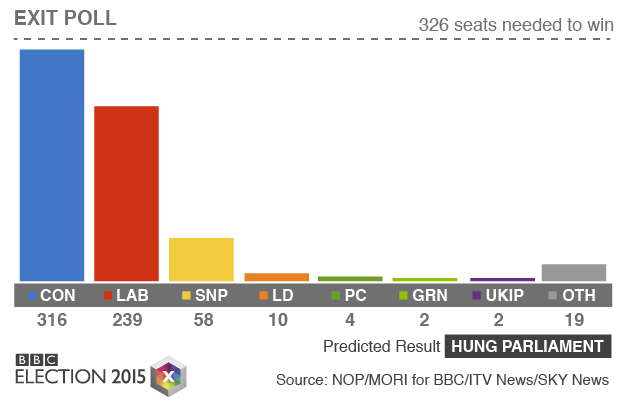
The exit poll predicts the SNP will be the third largest party in the House of Commons
Senior Liberal Democrat sources have admitted that former Chief Secretary to the Treasury Danny Alexander will lose his seat, while Labour sources at counts across the party's former strongholds have said they too are braced for defeat at the hands of the SNP.
Scottish Labour's Tom Harris told BBC Scotland he was going to lose in Glasgow South, while the party's leader Jim Murphy is said to be under serious threat from the SNP in East Renfrewshire.
There have also been suggestions that Labour is on course to lose all seven of its seats in Glasgow, and that former SNP leader Alex Salmond will win in Gordon.
Senior Labour sources also say they will lose Edinburgh North East, Edinburgh East and Edinburgh South West.
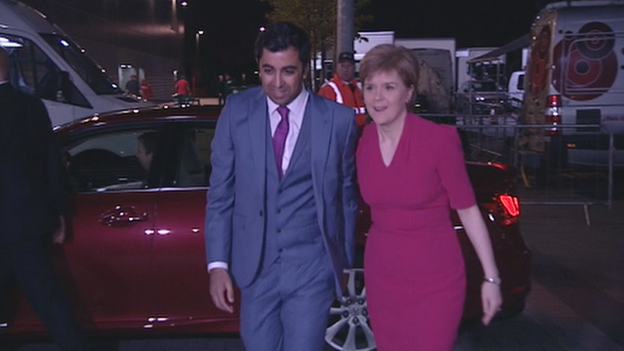
Nicola Sturgeon has arrived at the Glasgow counting centre in the Emirates Arena
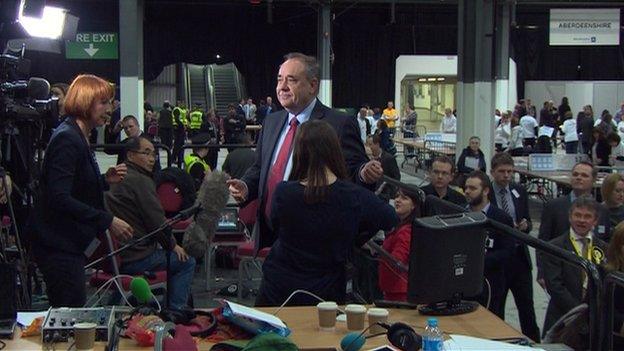
Former SNP leader Alex Salmond is expected to win the Gordon constituency
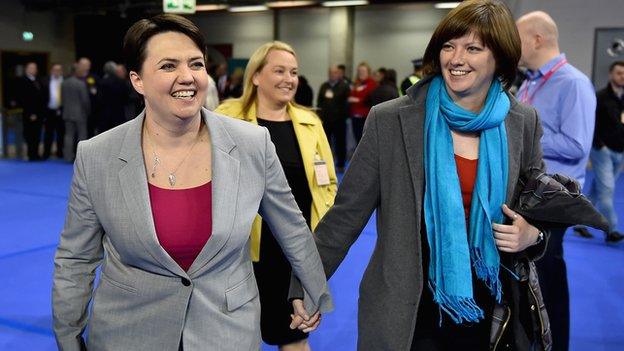
Scottish Conservative leader Ruth Davidson (left) has arrived at the Glasgow count
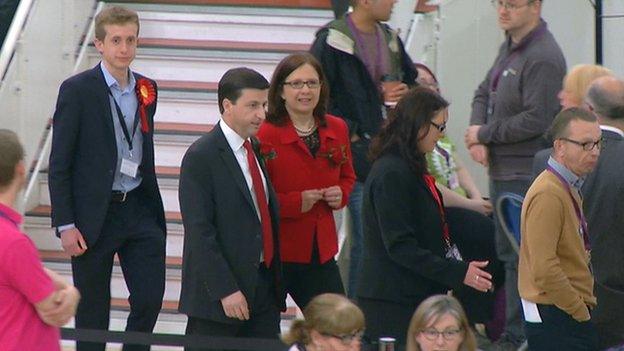
Labour heavyweight Douglas Alexander could be on the verge of losing to 20-year-old Mhairi Black of the SNP
If these predictions are true, it could suggest the exit poll conducted by GfK, NOP and Ipsos MORI on behalf of the BBC, ITV News, and Sky News is largely accurate, as it was in 2010.
The exit poll interviewed 22,000 people in 141 polling locations in 133 constituencies.
It had the Liberal Democrats on 10 seats, Plaid Cymru 4, UKIP 2, Green 2 and others 19.
It suggested Labour's vote could drop by about 18% on average in Scottish constituencies, coupled with an increase of more than 30% in the SNP vote.
If the exit poll is accurate, David Cameron could be on course to remain prime minister as the head of a minority government without the need for a coalition - although he might have to rely on the support of the DUP or the Lib Dems.
Reacting to the results, Scottish Conservative leader Ruth Davidson said the poll should come with a "health warning".
She told BBC Scotland's election night programme: "I remember 1992. Exit polls can get it pretty badly wrong. I'm going to wait until 3am or 4am before I start making predictions."

Analysis by Prof Charlie Jeffery, University of Edinburgh
We are hearing an extraordinary mood from the various counts around the country.
Pretty much everywhere in the country is reporting the SNP are in a really good mood and the other parties are not.
We are talking about seats where the swing to the SNP would be more than 20% on some occasions.
We were looking earlier and we could find very few historical examples where there has been a swing of more than 20% in a seat in a UK election ever.
We might see quite a few of those ever. If we get to 22% swing we think we have broken the record. That would be Rutherglen and Hamilton West

Kezia Dugdale, deputy leader of the Scottish Labour Party, said she hoped the poll was "badly, badly wrong" because Scotland could not afford another five years of the Tories.
Willie Rennie, leader of the Scottish Liberal Democrats, told the broadcaster: "This is underplaying our potential. We very much target our focus on certain constituencies."
The SNP's previous best result in a general election was when it won 11 MPs in October 1974, with 30.4% of vote.
A final poll of polls compiled by the Press Association ahead of the vote had put the Tories on 276 seats, Labour on 271, Lib Dems on 28, SNP 48, UKIP three and Greens one.
More than four million people in Scotland were registered to vote - about 94% of the adult population - and early indications have been that turnout is higher across the country than in 2010.
Extensive coverage
Several constituencies have reported turnout in excess on 70%.
There were more than 5,000 polling places in Scotland with schools, village halls and community centres transformed for the day to allow people to cast their votes.
Strict rules meant the BBC - in common with other broadcasters - was not allowed to report details of campaigning until after the polls closed.
BBC Scotland is delivering extensive coverage of the election results across online, TV and radio.
It will report live from Scotland's 32 counting centres, and there will be analysis, background, reaction and debate as we find out the results from each of Scotland's constituencies.
And the results of the ballot will also appear on the side of the building, which sits on the banks of the River Clyde in Glasgow.